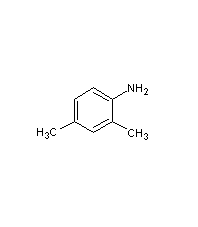2,4-Dimethylaniline 2,4-Xylidine


Structural formula
| Business number | 029K |
|---|---|
| Molecular formula | C8H11N |
| Molecular weight | 121.18 |
| label |
m-dimethylaniline, 2,4-Dimethyl-Benzenemine, 2,4-Dimethylaniline, m-Xylidine |
Numbering system
CAS number:95-68-1
MDL number:MFCD00007738
EINECS number:202-440-0
RTECS number:ZE8925000
BRN number:636243
PubChem number:24854443
Physical property data
1. Properties: colorless oily liquid [1]
2. Melting point (℃): -14.3[2]
3. Boiling point (℃): 214[3]
4. Relative density (water=1): 0.97 [4]
5. Relative vapor density (air=1): 4.18[5]
6. Saturated vapor pressure (kPa ): 0.05 (38℃)[6]
7. Octanol/water partition coefficient: 1.68[7]
8. Flash point (℃): 90.56[8]
9. Ignition temperature (℃): 460[9]
10. Explosion upper limit (%): 7.0[10]
11. Explosion lower limit (%): 1.1[11]
12. Solubility: Slightly soluble in water, soluble in ethanol, ether, benzene and other organic solvents. [12]
Toxicological data
1. Acute toxicity:
Oral LD50 in rats: 467mg/kg; Oral LD50 in mice: 250mg/kg; Inhalation LC50 in mice: 149ppm/7H;
2. Other multiple dose toxicity: rat oral TDLo: 1170mg/kg/10D-C; rat oral TDLo: 13300mg/kg/4W-I;
3. Mutagenicity
Mutation of Salmonella typhimurium: 1μmol/plate;
DNA synthesis in rat liver: 1μmol/L;
Transperitoneal DNA damage in mice: 200mg /kg;
Oral DNA inhibition in mice: 200mg/kg;
4. Acute toxicity[13]
LD50: 467mg/kg (rat oral)
LC50: 149ppm (mouse inhalation, 7h)
5. Irritation No data yet
6. Subacute and chronic toxicity [14] Rat intragastric doses are 25, 50, 100 and 250mg /kg for 7 consecutive days, liver weight increased. The dose is 400mg/kg, 7 days, and the liver weight is seriously damaged.
Ecological data
1. Ecotoxicity No data available
2. Biodegradability No data available
3 .Non-biodegradability[15] In air, when the concentration of hydroxyl radicals is 5.00×105/cm3 When, the degradation half-life is 2h (theoretical).
4. Other harmful effects [16] This substance is harmful to the environment, and special attention should be paid to the pollution of water bodies.
Molecular structure data
1. Molar refractive index: 40.13
2. Molar volume (cm3/mol): 124.2
3. Isotonic specific volume (90.2K ): 308.3
4. Surface tension (dyne/cm): 37.9
5. Polarizability (10-24cm3): 15.91
Compute chemical data
1. Reference value for hydrophobic parameter calculation (XlogP): None
2. Number of hydrogen bond donors: 1
3. Number of hydrogen bond acceptors: 1
4. Number of rotatable chemical bonds: 0
5. Number of tautomers: none
6. Topological molecule polar surface area 26
7. Number of heavy atoms: 9
8. Surface charge: 0
9. Complexity: 90.6
10. Number of isotope atoms: 0
11. Determine the number of atomic stereocenters: 0
12. Uncertain number of atomic stereocenters: 0
13. Determine the number of chemical bond stereocenters: 0
14. Number of uncertain chemical bond stereocenters: 0
15. Number of covalent bond units: 1
Properties and stability
1. Stability[17] Stable
2. Incompatible substances[18] Acids, acid chlorides, acid anhydrides, strong oxidants, chloroform, halogens
3. Conditions to avoid contact[19] Heating
4. Hazards of aggregation[20] No aggregation
Storage method
Storage Precautions[21] Store in a cool, ventilated warehouse. Keep away from fire and heat sources. Keep container tightly sealed. They should be stored separately from oxidants, acids, halogens, and food chemicals, and avoid mixed storage. Equipped with the appropriate variety and quantity of fire equipment. The storage area should be equipped with emergency release equipment and suitable containment materials.
Synthesis method
1. Prepared from m-xylene through nitration and reduction.
Purpose
1. Used as analytical reagents to produce dyes. [22]
